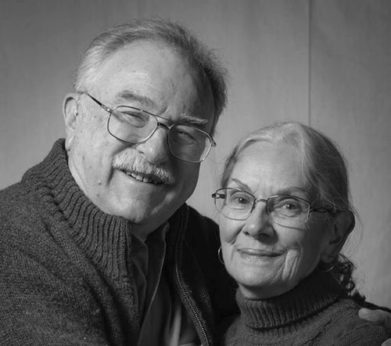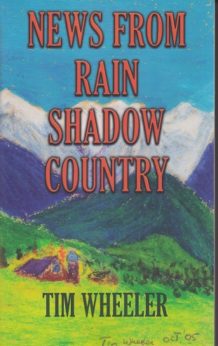
Tim Wheeler is a great storyteller. He’s also a wonderful landscape artist. Together these talents are on full display in his engaging new memoir, “News from Rain Shadow Country.”
The book is a mix of original stories and reprints of articles from the Daily World, People’s Weekly World and People’s World where Tim spent a career as both a reporter based in Washington, D.C. and editor-in-chief. His career as one of the great Marxist journalists spanned some 50 years. He’s still writing and painting in retirement.
The stories are enriched with Tim’s deep understanding of the big picture and a keen eye for detail. He offers rich depictions of events, full of contradiction, irony and humor, told in a passionate voice.
Some of the news articles left me hanging. How did the struggle turnout? Perhaps an addendum would have helped.
Most of the stories were written about “Rain Shadow Country,” as the Olympic Peninsula is known, a place Tim and his wife Joyce call home.
It’s the loving story of Native Americans, Asian Americans, African Americans, Mexican Americans, immigrants, workers, farmers, political activists, and the intersection of cultures and peoples that make the Dungeness River Valley, the Olympic Peninsula and the Pacific Northwest so unique.
It’s also the story of endless battles against the giant corporations intent on exploiting and despoiling its natural beauty and resources.
Many stories are from Tim’s youth on the family dairy farm in the Dungeness River Valley, “a place so arid that pioneers had to build an irrigation system to carry water from the Dungeness River to water the land.”
On the farm, Tim “learned to milk cows, drive a team of horses, properly build a hay load on our hay wagon.”
Tim’s father Don, a brilliant Rhodes Scholar, was employed by the U.S. government in Washington, D.C. Don and Tim’s mother Mary were members of the Communist Party USA, which he later joined. With the dawn of the McCarthy period Don was blacklisted.
In 1948, the family became “Cold War refugees”. Unable to find work, they picked up and moved to the Pacific NW to join grandparents, aunts, uncles and cousins.
The family experienced tremendous hardships, including Don Wheeler’s extended trips to Washington DC to appear before Congressional witch-hunt hearings.

Despite the Cold War hysteria, the Wheeler family was never ostracized. In fact, Tim describes the solidarity of courageous neighbors, teachers, classmates and public figures throughout the period.
These included the great African-American artist Paul Robeson. Tim witnessed Robeson’s famous performance at the Peace Arch, the natural amphitheater on both sides of the U.S.–Canadian border, May 18, 1952. Stripped of his passport, Robeson sang from the U.S. side to the thousands gathered on both sides of the border.
Upon hearing a recording of the Weaver’s, Tim’s younger sister Susan invited the great folk artist Pete Seeger to perform a concert on the Olympic Peninsula. To everyone’s great surprise, Seeger, who was blacklisted at the time, accepted. This began a life long friendship with Seeger.
There are also many stories of unsung heroes and grassroots fighters for workers and civil rights, peace and justice; people like Will Parry, Nancy Mendenhall, Wayne Ostlund and Honeybee Wheeler.
Other stories capture adventures of growing up in rural America. Tim tells a particularly harrowing tale of riding his sister Susan’s mare, Trumpet. Upon mounting, the steed took off like a rocket with Tim holding on for dear life. My heart was pounding and I shared Tim’s relief when the ride finally ended.
Another adventure took place during Tim’s sophomore year while attending Amherst College in Massachusetts. Homesick, Tim convinced a classmate to head west during spring break.
Both youth were broke so they hitch hiked cross-country. Things started out well, but in Nebraska the weather turned ugly. Temperatures plummeted and the ill-clad youth froze to the bone. After a “quixotic adventure,” the youth got stuck in Montana. Exhausted, they finally took a train and bus to their destinations.
I was totally engrossed by these stories with their rich detail and character development.
Many stories pay tribute to the heroic survival of Native Americans, and the fight for Treaty rights, sovereignty and efforts to preserve their culture. This includes the Quileute, Makah, and the S’Klallam peoples.
From Port Angeles Washington, Tim describes the celebratory welcome during the famous “Paddle to Elwha” that brought thousands of Pacific Northwest Indians to witness “the arrival of seventy-six dugout canoes from as far north as Alaska and far south as Coos Bay, Oregon.”
Tim writes of the battles that resulted in uniting Native American and non-Native communities against racist Republican Senator Slade Gorton. The mobilization of Native American voters was key to his final ouster in the 2000 elections.
Among the great victories was the removal of two dams along the Elwha river that had ruined the salmon spawning grounds. Once the river was fully restored, the salmon returned and so did Native fishing.
The book is full of colorful portraits of workers, activists and family members. One of the most interesting is about Tim’s great grandfather, Francis Marion Wheeler, who joined the Union Army at age 19 and rose to the rank of corporal.
During the Civil War, Wheeler fought in the Battle of Lookout Mountain, marched to Atlanta and then with Sherman to the sea. Tim took the story from an unpublished manuscript by Francis Marion Wheeler the family kept on its living room bookshelf.
Clearly Tim has activism and journalism in his DNA!
Another story recalls his visit as a 13-year-old to a logging camp at the invitation of Fred Gaboury, his good friend and comrade. Gaboury’s rugged life as a “tree topper” was reflected in his speech, “a steady stream of unprintable four-letter words.”
Tim vividly describes Fred doing his job with great skill, fearlessly working high up in the trees.
“When he reached the first branch, he pulled up a chain saw. Hanging in midair, he pulled on the starter cord until the saw sputtered into life. He cut off the branch above him, swinging around out of the way as the thick branch broke away and plunged to the ground.
“Higher and higher he climbed, cutting off the limbs as he worked his way up to the tree top. When he was 170-feet up, he cut off the top of the tree. He worked the chain saw around the trunk so it would break cleanly and not split the top the tree. That was a mishap that could ruin the spar tree and also kill the rigger.”
The book concludes with Tim’s reflections on current politics including the 2016 elections, involvement in both Bernie Sanders’ and Hillary Clinton’s campaigns and the battle against Trump and the “alt-right.”
One of Tim’s remarkable connections is with President Obama. It turns out Tim attended the University of Washington with Barack Obama, Sr. They became acquainted through another exchange student from Kenya, Muga Ndenga. Once Tim invited Muga and his fellow Kenyan to visit the family farm.
Obama drove with two women friends up front, while Muga, Joyce and Tim rode in the back seat. Tim writes, “Obama drove at eighty or ninety miles-an-hour on the twisting curves of Old Olympic Highway. We were convinced we all would die!”
They did arrive safely and the next day Tim proudly took everyone on a tour of the dairy farm.
“I sized Obama up: slim, dark complexioned, strikingly handsome, courteous and soft-spoken. Like Muga, he spoke the “King’s English.”
Obama Sr. dressed “like he had just stepped out of the pages of one of those fashion magazines. I decided then to remove from the tour a demonstration of the wonders of our manure pump.”
Tragically, Obama, Sr. died later in a fiery auto accident in Kenya. It was 40 years later Tim and Joyce realized they had hosted the father of the 44th president.
Many more compelling and heart warming stories await the reader. I’m left with eager anticipation for Tim’s next book, “News from the 99%: My life, the stories I wrote” due out later this year from International Publishers, New York.
News from Rain Shadow Country
By Tim Wheeler
Published by Booklocker.com
2017, 293 pages
Cover art and artwork throughout the book by the author
Trade paperback $17.95, Kindle $4.99










